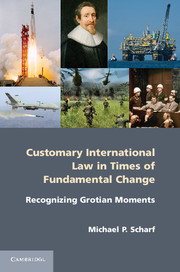Book contents
- Frontmatter
- Contents
- Author’s Biography
- Acknowledgments
- 1 Introduction
- 2 Historical Context
- 3 Theoretical Underpinnings
- 4 Nuremberg
- 5 The Truman Proclamation on the Continental Shelf
- 6 Outer Space Law
- 7 The Yugoslavia Tribunal’s Tadic Decision
- 8 The 1999 NATO Intervention
- 9 The Response to 9/11
- 10 Conclusion
- Index
- References
6 - Outer Space Law
Published online by Cambridge University Press: 05 June 2013
- Frontmatter
- Contents
- Author’s Biography
- Acknowledgments
- 1 Introduction
- 2 Historical Context
- 3 Theoretical Underpinnings
- 4 Nuremberg
- 5 The Truman Proclamation on the Continental Shelf
- 6 Outer Space Law
- 7 The Yugoslavia Tribunal’s Tadic Decision
- 8 The 1999 NATO Intervention
- 9 The Response to 9/11
- 10 Conclusion
- Index
- References
Summary
This chapter examines the customary international law rules that grew out of the U.S. and Soviet development of the ability to launch satellites and manned rockets into earth orbit and outer space in the 1960s. In response to this new technological development, in 1963 the UN General Assembly adopted the Declaration of Legal Principles Governing the Activities of States in the Exploration and Use of Outer Space, which provided that the provisions of the UN Charter, including limitations on the use of force, apply to outer space; outer space and celestial bodies are not subject to national appropriation by claim of sovereignty; states bear responsibility for parts of space vehicles that land on the territory of other states; the state of registry of a spacecraft has exclusive jurisdiction over it and any personnel it carries; and states shall regard astronauts as envoys and shall accord them assistance and promptly return them to the state of registry. Though state practice was limited in the early years of space exploration, ICJ Judge Manfred Lachs concluded that “it is difficult to regard the 1963 Declaration as a mere recommendation: it was an instrument which has been accepted as law.” The chapter analyzes whether the dawn of space law culminating in the 1963 declaration constituted a Grotian Moment, or whether the principles enshrined in the 1963 declaration should be discounted because the international community concluded a binding treaty on principles governing the activities of states in outer space in 1967, which some might argue has supplanted the 1963 declaration in the regulation of outer space activities.
Early History of Space Flight
The space age was inaugurated on October 4, 1957, when the Soviet Union launched Sputnik 1, the world’s first artificial satellite, which was followed by the launch of the U.S. satellite Explorer 1, a year later. In 1961, Soviet cosmonaut Yuri Gagarin became the first man to reach outer space. Between 1957 and 1967, when the Outer Space Treaty was concluded, the Soviet Union space program included Luna missions to the moon, Zond flyby missions to Mars, and Venera flyby missions to Venus, as well as manned Vostock, Voskhod, and Soyuz flights to earth orbit.
- Type
- Chapter
- Information
- Customary International Law in Times of Fundamental ChangeRecognizing Grotian Moments, pp. 123 - 138Publisher: Cambridge University PressPrint publication year: 2013



